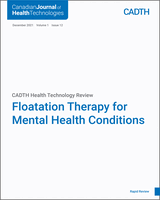From: Floatation Therapy for Mental Health Conditions

Floatation Therapy for Mental Health Conditions: CADTH Health Technology Review [Internet].
Tran K, Loshak H; Authors.
Ottawa (ON): Canadian Agency for Drugs and Technologies in Health; 2021 Dec.
Copyright © 2021 Canadian Agency for Drugs and Technologies in Health.
Except where otherwise noted, this work is distributed under the terms of a Creative Commons Attribution-NonCommercial-NoDerivatives 4.0 International licence (CC BY-NC-ND), a copy of which is available at http://creativecommons.org/licenses/by-nc-nd/4.0/
NCBI Bookshelf. A service of the National Library of Medicine, National Institutes of Health.